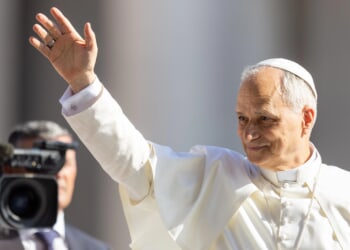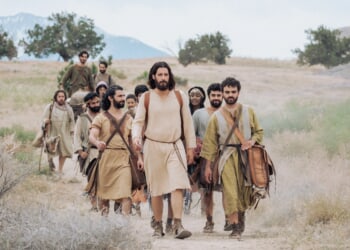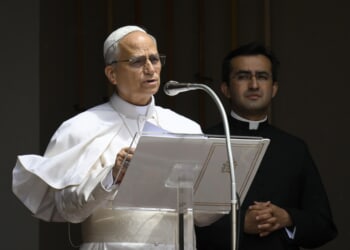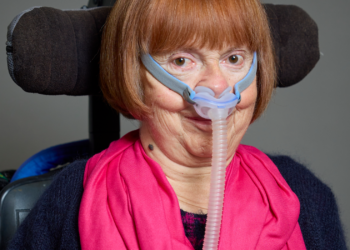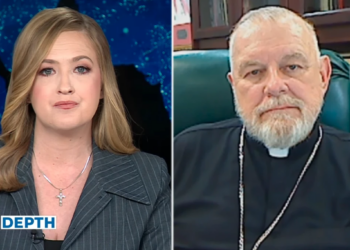Washington D.C., Jun 11, 2025 /
07:00 am
About 150 scientists gathered at the eighth annual Society of Catholic Scientists conference this past weekend for talks that touched on the Thomistic notion of free will, the intersection of mathematics and theology, near-death experiences, and the origin of the human species.
Three scholars — Kenneth Kemp, a professor emeritus of philosophy at the University of St. Thomas in Minnesota; Daniel Kuebler, a professor of biology at Franciscan University; and Chris Baglow, a professor of theology at the University of Notre Dame — gave talks on the compatibility of evolution and the teachings of the Catholic Church.
The conference ran from June 6–8 at The Catholic University of America in Washington, D.C.
Although the teaching of evolution in high schools has led to objections from some Christian groups over the past century, the Catholic Church does not condemn the belief that humans evolved from an ape-like ancestor.
In 1950 — nearly a century after Charles Darwin published “On the Origin of Species” — Pope Pius XII addressed the subject in the encyclical Humani Generis. The pontiff did not rule out bodily evolution but made clear that the human soul is directly created by God and all humans are descendants of the first two people: Adam and Eve.
The Holy Father stated that the Church does not oppose inquiries into “the origin of the human body as coming from preexistent and living matter” but noted the faith “obliges us to hold that souls are immediately created by God.”
When addressing the teaching that every person is descendent from Adam and Eve, Pius XII rejected any opinion that “maintains that either after Adam there existed on this earth true men who did not take their origin through natural generation from him as from the first parent of all, or that Adam represents a certain number of first parents.”
‘Biological’ and ‘theological’ humans
Most evolutionary biologists assert that biological humans did not evolve from only two humans but rather as a group of humans. Although on its face this may seem to conflict with the Catholic understanding of Genesis, the conference speakers argued that no contention exists and suggested there is a distinction between a “biological” human and a “philosophical” and “theological” human.
Kemp, the first to speak on the subject, said a “biological” human would be any human that possessed human DNA, while a “philosophical” human is a human that also possessed conceptual thought and free will, and a “theological” human is one that has the ability to form a relationship with God.
According to Kemp, someone who was “fully human” in the early development of man (what Pius XII would refer to as “true men”), was one who possessed a “philosophical-theological humanity” from which he believes all of modern-day humanity descends. Such a person was an ensouled creature with rationality who had the capability to develop logic, language, and culture.
“Fully human beings were capable of interbreeding with the merely biological human beings despite the fact that they are distinct both behaviorally (being rational) and structurally (having the created souls that make that rationality possible),” Kemp said.
“If God created rational souls into two members of a merely biologically human population, and then into all or most of their descendants, including the descendants of mixed parentage, but into no one else, and some fully human beings interbred with the merely biologically human beings, then even a low level of interbreeding could be expected to produce a species all of which would be descendant from the single original fully human couple,” Kemp argued.
This position, according to Kemp, is both “scientifically possible and theologically orthodox.”
The beginnings of humanity
Kuebler, a biologist who spoke after Kemp, expressed a similar distinction. A biological human would be any human who fit into the species of “Homo sapiens” and a theological human is a person made in the “imago Dei,” or the image of God. He similarly said that it is possible that some of the early humans could have possessed merely biological humanity before all of the species possessed theological humanity.
(Story continues below)
Subscribe to our daily newsletter
The exact moments when biological humanity came into existence, when the first two theological humans Adam and Eve were ensouled, and when all of biological humanity possessed theological humanity, cannot be easily determined, according to Kuebler.
However, he noted there are signs that can point to rational thought. He points to the use of composite tools and art about 200,000 years ago and to the use of ochre (a type of clay) for decoration, which began around 500,000 to 300,000 years ago and became widespread about 150,000 years ago.
Yet, Kuebler said the signs become more clear around 50,000 to 100,000 years ago with more ritualistic art and the creation of jewelry, which he said “are things that are made by people with rational and conceptual thought.”
“The best signs of it are about 100,000 years ago,” he added.
Baglow addressed the question of where Neanderthals fall in these classifications, saying he is “not sure whether Neanderthals were theological humans” but remains open to the possibility. Neanderthals went extinct about 40,000 years ago but also interbred with early modern humans. Most people outside of Africa have some Neanderthal DNA.
He referenced the early cave art of Neanderthals as being similar to early modern humans but said “images [are] not necessarily symbols,” and rationality in art is “when an image begins to stand for something else.”
Although Baglow said it is possible that Neanderthals were theological humans, he said it may be the case that they simply had “a very special form of pre-rationality,” which was “preparatory toward personhood” for when they interbred with early modern humans.
Even though Catholic doctrine shows that evolution does not conflict with the faith, the Church does not require that Catholics believe in it.
According to a 2024 Gallup survey, about 62% of Catholics say they believe humans developed over millions of years from less advanced forms of life and about 32% said they believe God created humans in their current form within the last 10,000 years, illustrating that Catholics are slightly more likely than the average American to believe in human evolution.




